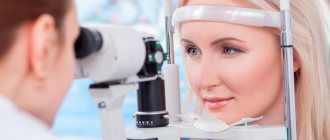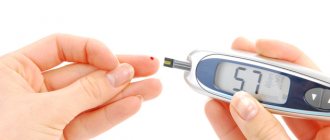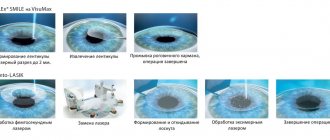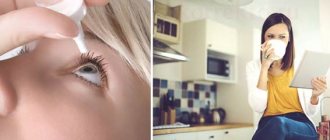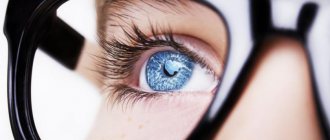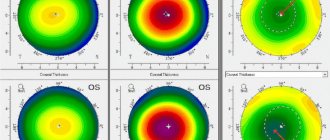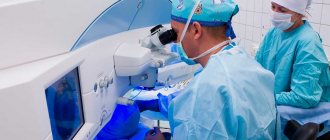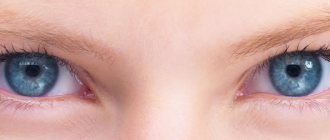Laser vision correction can improve the functionality of the eye, eliminate cataracts, poor visibility near and at a distance, and astigmatism. The effectiveness of therapy and the durability of the result are influenced by the patient’s behavior during the recovery period.
To do this, he must follow the recommendations in the first days after surgery, follow the doctor's instructions, do eye exercises and use eye drops.
After laser correction, hospitalization is not required. An hour or two after the operation, the ophthalmologist examines the cornea of the eye and, if there are no abnormalities, sends the patient home.
Patient's actions after laser correction
After laser vision correction, the patient is in the clinic under observation for one to one and a half hours. If there are no complications and no threat to the health and life of the person being operated on, he is discharged home. It is recommended to do this not on your own, but with an accompanying person.
To speed up the healing process, you should wear special sunglasses from the day of discharge until the end of the rehabilitation period. Do not apply any makeup or eye cream, spray perfume or hairspray.
To protect against bacterial infection, the ophthalmologist prescribes antibacterial and anti-dry eye drops. The frequency of installations and duration of use depends on individual indicators and is determined by the attending physician. For a couple of days after the operation, a ban on the following activities is imposed:
- car driving;
- various ways of overstraining the visual apparatus - gadgets, books with small print, newspapers, computer monitors, televisions;
- physical activity, sports;
- lifting weights.
In the first days, a gentle regime is necessary. The patient’s further condition and the speed of rehabilitation depend on it.
Immediately after the operation, the “supine” position is chosen for sleeping. Then other positions are allowed, with the exception of facing the pillow.
After surgery, itching, tearing and other signs of dry eye syndrome may occur. Rubbing the eye, even through a closed eyelid, is unacceptable to eliminate unpleasant sensations.
Features of active recreation
After laser correction, it is necessary to avoid direct sunlight in the eyes. For a period of three to six months, you should avoid visiting the solarium and seaside recreation. To eliminate the risk of burning the mucous membrane of your eyes, purchase high-quality dark glasses with UV protection. Opt for optics with lenses made of durable brown material.
For seven days after the intervention, refrain from traveling long distances so that you can visit the clinic for examination. If you are traveling to a country with a hot climate, be sure to wear protective glasses that block ultraviolet A and B rays.
Sunbathing is prohibited for a month. And in general, during the rehabilitation period, the beach is not the best place to spend time. Not only water, but also sand can get into your eyes. For winter sports, buy special glasses - a “mask”. They provide maximum protection from ultraviolet radiation, which is abundant in snow-capped mountains.
Duration of the rehabilitation period after different types of correction
The duration of the recovery period directly depends on the type of surgical intervention, the patient’s condition and its characteristics, and compliance with the specialist’s instructions.
The oldest type of laser correction is photorefractive keratectomy.
It is characterized by the longest rehabilitation period – a month. On the first day, patients note blurred contours of objects and blurred vision, the inability to focus on an object and a painful reaction to light.
These sensations pass in about a day; complete restoration of vision takes up to five days. During the entire recovery period, prohibitions and restrictions on visual or optical and physical strain should be observed.
The safest and most gentle operation is LASIK, or laser epithelial keratomileusis. Primary rehabilitation takes 8 hours. During this time, vision is restored, and unpleasant and painful sensations partially disappear. The complete rehabilitation period is a week.
A shorter recovery period is typical for laser-assisted keratomileusis, or LASIC. It ranges from 2 to 6 hours depending on the patient’s condition, history of concomitant diseases, age and degree of the operated disorders.
Doctor's instructions after laser vision correction
To quickly restore vision and minimize side effects, you must strictly follow the instructions of your ophthalmologist:
- appear for preventive examinations on time - usually carried out the next day after surgery, after 7, 30 days, six months and a year;
- drip prescribed medications;
- in the first days, adhere to a gentle regimen, eliminating physical and visual stress;
- refrain from drinking alcohol, lifting heavy objects, visiting bathhouses and saunas;
- sleep on your back;
- wear sunglasses; sunbathing is not allowed;
- in case of severe pain and instability of the nervous system, it is allowed to take painkillers and sedatives recommended by a specialist;
- adhere to other recommendations of the ophthalmologist, observe prohibitions and contraindications.
Additionally, it is useful to do eye exercises.
Contraindications and prohibitions after laser correction
During the rehabilitation period, restrictions and prohibitions are imposed on the following types of activities:
- visiting a bathhouse, sauna, solarium, sun exposure and tanning;
- lifting weights, physical activity;
- strong visual stress - watching TV, reading small print books, working on a computer and gadgets;
- use of contact lenses;
- the use of cosmetics and decorative products, hairsprays, eau de toilette and perfumes;
- washing the head and face with cleansers and soap; if it gets into the eyes, visibility deteriorates and the rehabilitation process slows down;
- being on a sunny day without tinted sunglasses;
- alcohol consumption.
For a speedy recovery, it is important to normalize your diet by eliminating foods that lead to constipation and alcoholic beverages. The latter worsen the effects of antibacterial drugs and increase the load on the liver.
If soap or cleansers get into your eyes, do not rub them. It is enough to drip any drops that have an antibacterial, anti-inflammatory or moisturizing effect to wash the eye, remove particles of aggressive substances and reduce negative consequences.
Nutrition rules
There are no dietary restrictions after laser vision correction. But it is worth creating a menu in such a way as to exclude from it foods that can cause constipation. You need to give up alcoholic beverages for at least ten days (and preferably twenty). This is necessary to reduce the degree of stress on the body while taking medications.
In the first three days after correction, alcoholic beverages are strictly prohibited! It reduces the impact of antibiotics. In addition, in a state of intoxication it is easy to injure the organ of vision. Alcoholic drinks in combination with medications increase the load on the liver and can provoke the development of dry eye syndrome. Return to contents
Eye exercises
They should not be done in the first days after surgery. Then eye exercises are an additional measure to improve vision and maintain the results. You can do gymnastics after the normal reaction of the eye to light or other visual stress has returned.
Exercises:
- Blink for 15-20 seconds, but do not close your eyes too tightly;
- make 10-12 rotations clockwise and the same amount counterclockwise with open, then closed eyes;
- for a couple of minutes, focus your gaze on a distant object, then on a near object and alternate actions;
- close your eyes for a couple of minutes and sit in peace and quiet.
You should stop the exercises if they cause discomfort or pain. After a couple of days, you can try the eye gymnastics again.
Using eye drops
After the operation, the patient is observed by an ophthalmologist for an hour. A sheet of recommended eye drops is then given.
To reduce the risk of postoperative consequences - corneal swelling, inflammatory processes, dry eyes - 3 groups of drugs or combination medications are prescribed:
- antibacterial agents;
- glucocorticoids;
- corneal protectors and artificial tear preparations.
After this type of improvement and restoration of vision function, infectious and inflammatory processes in the eye rarely occur, since no instruments are introduced inside during the operation. To reduce the risk indicator to a minimum, it is recommended to drip antibacterial drops for up to 5-7 days in the prescribed dosage and frequency of use. The most prescribed and safe medications are Tobrex, Tobriss, Tsiprolet, Tsipromed.
After surgery, corneal swelling may occur and may persist for a couple of days. To reduce negative manifestations, hormonal drops based on Dexamethasone are used - Oftan Dexamethasone, Maxidex, Russian or Belarusian Dexamethasone.
To reduce dry eye syndrome, artificial tears and protectors are used: Korneregel, Oftagel, Hilo-Komod, etc.
A drug containing immediately an antibacterial and antiallergic, decongestant component - Tobradex.
When prescribing several medications in the form of drops, it is necessary to maintain a 10-15 minute interval when instilling them. If Korneregel is used, it is used last. It helps keep other drugs on the surface of the eye and enhances their effect.
Eye drops after vision correction: which are better?
— I’ve come across reviews from people who would like to unscrew everything back, albeit for poor eyesight, but without problems with dry eyes. - Well, nooooo! ))
Overheard on one of the forums
Laser vision correction is a highly effective and affordable method for correcting most refractive pathologies. But this is a surgical intervention, which has its own rehabilitation period. New vision stabilizes on average (for different types of operations) after a month. By this time, the tissue healing process is completed. In order for the rehabilitation to go smoothly, it is imperative to instill special drops into the operated eye. What, why and for how long to drip, we explain in this article.
Why are drops needed after eye surgery?
After laser vision correction, all patients, without exception, are prescribed two types of eye drops:
- antibacterial,
- moisturizing.
Antibacterial drops
After laser operation, a wound surface remains on the cornea. In PRK, it is covered with a protective lens; in LASIK, it is covered with a corneal flap bent during the operation. Until it heals, it must be protected from infections. Antibacterial drops are prescribed starting from the day of surgery for a week. They need to be dripped according to a certain pattern, several times during the day, in order to maintain the concentration of the medicine at the required level.
The drops need to be applied several times a day. This way the desired concentration of the drug is maintained.
A week later, at a follow-up examination in the clinic, depending on the dynamics of healing, the doctor decides to stop or extend the time of taking the drug. The medication may need to be changed, or additional corticosteroids may be prescribed.
Moisturizing drops
After vision correction, moisturizing drops are prescribed for a month or longer. They imitate human tears, are non-addictive, absolutely harmless and can be used as long and often as necessary.
Why do you have to moisturize your eyes?
One of the most common side effects after laser vision correction is dry eye syndrome. It is temporary and usually goes away within a week to a month. This is a consequence of a laser burn to the cornea and microdamage to the conjunctiva during the installation of an eyelid fixator, as well as the use of various drugs before and during surgery.
After surgery, patients report dryness and burning in the eye, a feeling of a foreign body, as if sand had entered. As a rule, the sensations appear in the late afternoon, and along with them, instability of vision and blurred images. A slight redness of the eye is normal. In bright light, the syndrome intensifies, as does with intense visual stress. Therefore, during the rehabilitation period, it is advisable to wear dark glasses even at home and not overload your eyes.
Moisturizing drops will help improve visual function and relieve discomfort. They promote healing and cleansing of tissues (for example, they mechanically remove dust particles that accidentally enter the eye) and reduce the risk of infection. There is no need to endure discomfort! This is definitely not a reason to test your endurance and not an article for saving money. Fabrics need hydration. Chronic drying of the cornea is dangerous due to the development of complications, which are more difficult and expensive to treat: keratitis, blepharitis, erosions and corneal ulcers. Do not neglect your doctor's advice regarding taking eye drops after vision correction!
Why can't human tears cope?
There is little tear fluid
As a result of damage to eye tissue during surgery, tear production may be temporarily reduced. The cornea dries out. Even in the morning the patient experiences difficulty opening his eyes. Friction when blinking irritates the unhealed edges of the wound and prevents its recovery.
The composition of tears is disrupted
Human tears have a complex composition. A disruption in the production of one of the components affects its quality. For example, due to injury to the conjunctiva, the production of mucins, a gel-like substance that provides adhesion to the tear film and the surface of the eye, suffers. And a reduction in lipid production increases tear evaporation. The film bursts prematurely, not having time to moisturize and nourish the cornea. Dry eye syndrome may be accompanied by profuse lacrimation, which does not bring relief.
Pharmacological support is required - moisturizing drops, but in each situation it is different, aimed at eliminating a specific problem.
What types of moisturizing drops are there?
All moisturizing drops imitate human tears, but they are distinguished by:
- Consistency: liquid and gel-like. A more viscous consistency ensures a long-lasting effect, but is not always convenient for use if you are outside the home, for example, in the office or on the road. Typically, gel-like preparations are prescribed before bedtime.
- Release form. Almost all drops come in small bottles with a dropper spout, but most must be stored in the refrigerator because they are not airtight. There are disposable dropper tubes - they are convenient to take with you and they are hygienic.
- Active substance - to solve various eye problems associated with a feeling of dryness. Preparations based on hyaluronic acid or povidone promote tissue regeneration and compensate for the deficiency of the water-mucin layer of the tear film. As a rule, these eye drops are prescribed immediately after laser vision correction. But if there is a lack of lipids in the tear, they, unfortunately, will not help. A lipid nanoemulsion will be required as a tear substitute, which will prosthetize the lipid layer of tears. But moisturizing drops with a vasoconstrictor component, although they give a good visual effect, as they relieve redness, are not recommended after eye surgery - they prevent the production of your own tears.
Which ones are better? There are no good or bad drops, there are suitable and unsuitable for solving individual problems associated with dry eyes, taking into account the patient's lifestyle.
Choosing your own moisturizing drops is a thankless task. Without knowing what lies behind the discomfort in the eyes in your particular case, you can spend a long time sorting through seemingly identical bottles of drops. And even more so, price should not be a guideline for choice. At best, the drops will not help, at worst, you may miss the onset of a serious illness. It is impossible to independently determine what is happening to the eyes: an allergic reaction or, say, filamentous keratitis, which at the initial stage is similar to the manifestations of dry eye syndrome, but requires different treatment.
Therefore, be sure to consult an ophthalmologist if:
- the drops recommended for you after laser vision correction do not bring relief;
- painful sensations and cloudy discharge from the eye appeared;
- More than a month has passed, and the degree of dry eye has not returned to the preoperative state.
Only on the basis of objective data from additional diagnostics will the doctor determine why the sensations that bother you appeared after laser vision correction and what drops should be applied in this case.
Why do you sometimes have to use moisturizing drops after vision correction for longer than usual?
The quantitative and qualitative parameters of tears are usually restored within the first month after surgery. But it is very rare that the feeling of dryness persists even several years after correction.
There may be several reasons for this:
- dry eye at the time of surgery - if before laser vision correction you regularly had to use moisturizing drops, the syndrome will almost certainly not disappear after the operation;
- high degree of myopia - the deeper the cornea needs to be treated, the more damaged are the nerve endings in it, which are also involved in the production of tears (the healing process of the cornea in these cases can take up to 8-12 months after surgery);
- long-term wearing of soft contact lenses, which have a direct damaging effect on the lacrimal glands and the ocular surface;
- hormonal changes (thyroid disease, menopause in women, and even taking hormonal medications) can lead to dysfunction of the lacrimal glands;
- lack of vitamin A;
- prolonged work at the computer, when the natural blink rate is reduced;
- long stay in an air-conditioned room;
- incorrectly selected moisturizing drops.
If moisturizing drops are not selected correctly, the feeling of dryness in the eyes will persist.
Summarize:
- To help your eyes recover faster after laser vision correction, follow your doctor’s recommendations and take antibiotics and tear substitutes prescribed according to the recommended regimens.
- If your eye condition worsens, contact a specialist immediately; do not select drops for yourself!
- Sometimes long-term use of moisturizing drops is required, but this usually does not cause much inconvenience and does not cause dissatisfaction with the result of the operation. The benefits of having good eyesight outweigh!
Makeup after laser correction
After laser vision correction, you should not wear makeup before the operation and 2 days before it. This restriction applies for 2 weeks after. This applies to decorative cosmetics and eyelid skin care products.
Removing waterproof mascara requires the use of special aggressive liquids and friction for best results. Therefore, this cosmetics should not be applied within a month after vision correction surgery.
The eyes require additional protection from foreign bodies and provoking factors. For this purpose, during the rehabilitation period it is not recommended to spray hair sprays, use perfumes or eau de toilette.
If used carelessly, resulting in particles of the substance getting into the eyes, they must be washed carefully with running water and antibacterial or moisturizing drops applied. No friction allowed.
Driving after laser vision restoration
After surgery, you can drive only with the permission of your doctor. In order not to create an emergency situation on the road, a person must clearly see at a distance of twenty meters. You will have to stop driving until your visual function stabilizes.
Even if cloudy eyes and blurriness appear sporadically, you need to wait until they completely disappear. After restoration of vision, it is not recommended to drive a car in the dark. And driving for a long time can negatively affect the results of the operation.
Useful video
Dmitry Dementyev about indications and contraindications for laser vision correction, possible complications.
Author's rating
Author of the article
Alexandrova O.M.
Articles written
2031
about the author
Was the article helpful?
Rate the material on a five-point scale!
( 6 ratings, average: 4.00 out of 5)
If you have any questions or want to share your opinion or experience, write a comment below.

